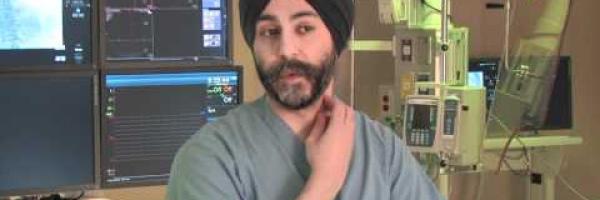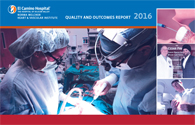Carotid Artery Disease
When your carotid arteries are narrowed — also called stenosis — a blood clot could completely cut off blood supply to the brain and cause a stroke. Plaque-narrowed arteries can also lead to a stroke if a piece of plaque breaks off from the artery wall and travels into your brain, creating a blockage in a smaller vessel.
When your brain is deprived of its blood supply for more than a few minutes, brain cells begin to die. Without immediate treatment, a stroke can have devastating effects.
More than half the strokes that occur in the U.S. are caused by carotid artery disease, so it’s important to treat the condition before it leads to a life-threatening emergency.
Prevention
You can help prevent carotid artery disease and stroke by making a few lifestyle changes to minimize your risk:
- Eat a healthy diet. Opt for a variety of fresh vegetables, fruits and whole grains, and choose lean meats and low-fat dairy products. Minimize saturated and trans fats, cholesterol, salt and added sugar.
- Maintain a healthy weight and exercise regularly. If you're overweight, talk to your doctor about a diet and exercise program that's right for you. Controlling your weight and being physically active will improve your overall health and lower your risk of carotid artery disease and stroke.
- If you smoke, quit. Smoking damages blood vessels and increases your risk of carotid artery disease and numerous health conditions. Also, try to avoid second-hand smoke.
- Talk to your doctor about your family history. If someone in your family has had carotid artery disease, it can help your doctor determine what precautions are appropriate for you.
Need help changing your diet, quitting smoking or managing stress? The Norma Melchor Heart & Vascular Institute at El Camino Health offers a variety of classes and programs to help you prevent stroke and heart disease and lead a healthier life.
Symptoms
Carotid artery disease may not cause any symptoms until your artery becomes severely narrowed or blocked. In some cases, the first sign of the disease is a transient ischemic attack (TIA) — also called a "mini-stroke" — or a stroke. Although symptoms usually go away on their own, a mini-stroke has the same symptoms as a stroke, including:
- Sudden weakness or numbness in your face or limbs, often on just one side of your body.
- The inability to move one or more of your limbs.
- Trouble speaking or understanding speech.
- Sudden difficulty seeing in one or both eyes.
- Dizziness or loss of balance.
- A sudden, severe headache with no known cause.
Even if symptoms go away, call 911 and get help immediately. It's important to get checked and start treatment right away. Thirty percent of people who have mini-strokes have a stroke later, about half within a year. Getting medical care right away can help you prevent a stroke from occurring later.
Diagnosis
During a physical exam, your doctor may hear a whooshing sound, called a bruit, when he or she listens to your carotid arteries with a stethoscope. This sound can be a sign that plaque buildup is reducing blood flow through your arteries — though not everyone with carotid artery disease has bruits.
At El Camino Health, our vascular specialists use advanced diagnostic imaging — including carotid ultrasound and CT angiography — to detect carotid artery disease. By identifying plaque buildup in the early stages, your doctor can treat the problem before it causes a stroke.
Treatment
Depending on the severity of your condition, your doctor may suggest lifestyle changes to lower your risk of stroke, such as losing weight, exercising, quitting smoking and eating a healthy diet. In some cases, your doctor may prescribe anticlotting medications or other medicines to treat the underlying conditions that increase your stroke risk.
If your arteries are significantly narrowed — usually 50 percent or more — your doctor may recommend surgery to remove the plaque. El Camino Health offers advanced, minimally invasive procedures to unblock arteries, which only require a small incision in your arm or upper thigh. Our heart and vascular specialists have the expertise to offer solutions for even the most advanced carotid artery disease.

